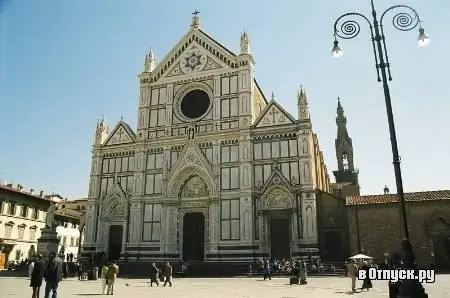
Description of the attraction
The Church of Santa Croce is a unique monument of great historical value, not only for the purity of the expression of the Gothic style, but also for the wealth of artworks it contains. The creation of the Basilica of Santa Croce (Holy Cross), one of the largest churches in the city, is attributed to the brilliant master Arnolfo di Cambio, who began working on it in 1294. Work continued until the second half of the 14th century, but it was consecrated only in 1443. The facade with its three portals, designed by N. Matas, dates back to the 19th century. The bell tower, dating from the same period (1847), was built by the architect G. Bakcani. A portico of light, almost airy arches runs along the left side of the basilica.
The stately interior consists of three naves. The central nave is separated from the lateral ones by slender octagonal pylons, from which pointed arches with double framing rush upwards like streams of a fountain. The beauty of the church suffered somewhat from the redevelopment undertaken in the 16th century. The church has a truss-type ceiling; in the floor - ancient tombstones throughout the space of the naves.
There are several chapels in the transepts, among which is the Maggiore Chapel with the fresco "Legend of the Holy Cross" by Agnolo Gaddi. (1380). In the altar there is Jerini's polyptych depicting the Madonna and Saints, and above is the Crucifixion of the Giotto school. The stained glass windows date back to the 14th century.
The most famous tombstones are located along the walls of the right nave: the monument to Michelangelo by Vasari (1579), the monument to Dante Alighieri by the sculptor Ricci (1829), the monument to Machiavelli by Spinazzi (1787) and the monument to Galileo Galilei.
On the right side of the transept is the Castellani Chapel with beautifully executed frescoes by Agnolo Gaddi (1385) depicting scenes from the Lives of the Saints. In the altar is the Crucifixion of Jerini.
At the bottom of the transept is the Baroncelli Chapel with a beautifully Gothic family tomb and a niche decorated with a fresco by Taddeo Gaddi - Madonna. On the walls there are frescoes by the same artist depicting scenes from the Life of the Virgin Mary. Altar polyptych Coronation of the Virgin Mary by Giotto.
Michelozzo's portal leads to the Sacristia, where in the Rinuccini Chapel one can admire the frescoes depicting the Life of the Magdalene and the Virgin Mary by the artist Giovanni di Milano. The altarpiece by Giovanni del Biondo (1379) is beautiful. In addition to the above chapels, the Church of Santa Croce also has chapels that store priceless works of art: Medici Chapel, Velutti Chapel, Peruzzi Chapel, Bardi Chapel, Tosigny Chapel, Pulci Chapel.
In the depths of the Monastery Courtyard of the Basilica of Santa Croce, the Chapel dei Pazzi opens - a beautiful creation of Brunelleschi, who began work in 1443. The decoration of the chapel was made by such masters as Desiderio da Settignano, Luca della Robbia, Giuliano da Maiano. The chapel is preceded by a pronaos of Corinthian columns. The small dome with a conical roof and a circular lantern was completed in 1461. The interior is the embodiment of the beauty and harmony of the Renaissance: gray stone pilasters emphasize the whiteness of the walls.






